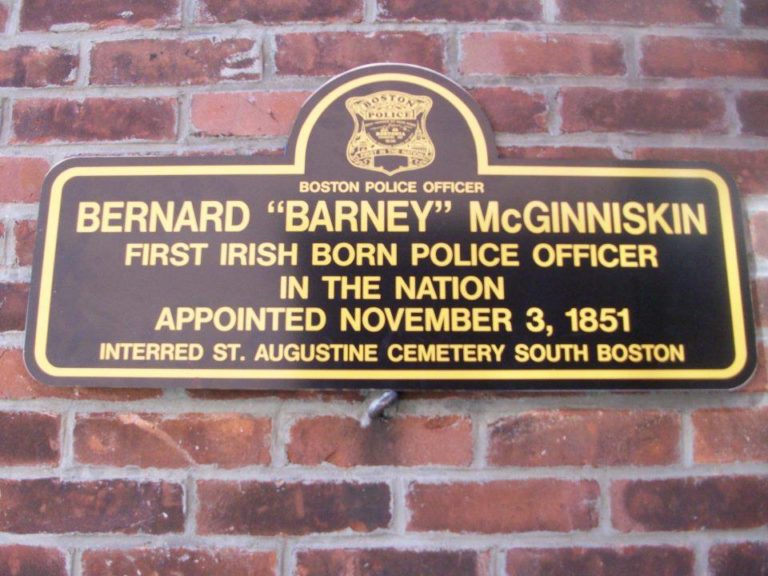St. Patrick’s Day is around the corner and Irish-Americans — and those who love the culture — are gearing up for a grand celebration. Although Boston’s historic St. Patrick’s Day parade is canceled for a second year in a row due to COVID-19, the impact this community has made on the city and in policing specifically is still something to be celebrated.
Indeed, the emergence of modern-day policing and the rise of the Irish within the power structure of Boston go hand-in-hand. Today, the image of a brusque Irishman in blue is nearly synonymous with policing in northeastern cities, and regularly plays a role in movies, television, and even cartoons.
However, it wasn’t always so. For many years, the Irish community suffered from a strong anti-immigrant, anti-Catholic sentiment. Even though their presence in Massachusetts dates back to before the American Revolution, it took another 150 years for society to accept them in roles of authority.
America’s first Irish-born police officer takes the fall
Barney McGinniskin emigrated to America in the 17th century from Connacht, Ireland, a “rocky, unfertile province” where his fellow Irish were starving as a deadly virus destroyed their potato crops and an unflappable English ruler stood blindly aside, ascribing the famine to a provincial turn of events.
The strapping 6-foot laborer settled into the deeply Irish community populating the North End and quickly gained the attention of the local police, who, according to Kevin Cullen, Boston Globe columnist, thought “it would make more sense to put an Irish cop on the streets where the Irish comprised a third of the population.”
His ascent into the police department in 1851 did not last long, though. McGinniskin, who is considered the first Irish-born police officer both in Boston and in the United States, quickly became a scapegoat during a tumultuous time in American history, spending only three years on the streets before political forces eviscerated his career.
The Irish curse
Mass migration from Ireland to the United States did not start until about 60 years after the American Revolution. Throughout the mid-1800s, rural tenement farmers escaping the “Great Hunger” poured from the Emerald Isle into North America for unfamiliar city life. They soon took low-paying unskilled work and found housing in neighborhoods which morphed into city slums. These hard-bitten subsistence farmers were viewed disdainfully by Boston’s Protestant upper crust, who found their Catholic faith and foreign ways threatening.
In 1845, Boston created the nation’s first full-time police department, one year after the Broad Street Riots, a clash between an Irish funeral procession and a volunteer firefighting company made up of American-born Protestants.
At the time, impoverished Irish-Americans were considered among the “dangerous classes,” and as policing shifted from catching criminals to preventing crime, the poor were frequent targets, arrested for disorderly conduct or public drunkenness. This arbitrary designation barred them from burgeoning police departments, as community leaders considered them unfit for duty.
The Know-Nothing Party asserts its strength
At the time of McGinniskin’s hiring, a nativist group known as the “Know Nothing Party” gained extraordinary political power, playing into this strong anti-Irish, anti-Catholic sentiment, and eventually gaining control of the Massachusetts legislature for several years.
City Marshall Francis Tukey, who had argued against McGinniskin’s appointment as it was done “at the expense of an American,” fired McGinniskin on January 5, 1852, shortly before newly elected mayor Benjamin Seaver came into office.
Public embarrassment soon forced the new mayor to reinstate McGinniskin.
However, by 1854, bowing to a groundswell of pressure by the Know-Nothing Party movement, McGinniskin again lost his job. He went on to work as a United States inspector at a customhouse and died in 1868.
As reported in the Boston Pilot, “Mr. McGinniskin was discharged from the Boston Police for no other reason than he was a Catholic and born in Ireland.”
It would take several more decades and a growing Irish voter base to turn the minds of city officials. Nature and political clout took its course and, by the mid-20th century, Irish-American police officers assumed leadership roles in precincts nationwide.
The Hundred Club — Serving the Community
At The Hundred Club of Mass., we care for those who care for us. When these everyday people-turned-heroes lose their lives in the line of duty, we are here for their families. When a police officer or firefighter dies, in many cases, their paycheck and insurance stop before their death benefits begin, which is where the Hundred Club steps in to help. Your generosity provides immediate support to the families of these everyday heroes; funds they can rely upon to pay rent, groceries, and other bills. Help us continue the tradition of caring for those who care for us. Donate to the Survivor’s Fund: https://100clubmass.org/donate/

